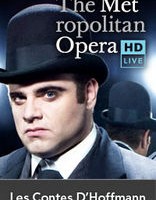

Bartlett Sher‘s production lovingly displays the many dimensions of Offenbach’s inspired and charming opera. With perfect comedic timing, clarity of action, and real depth of feeling, even its few cheap moments seemed top-shelf.
Maltese tenor Joseph Calleja, who pulled out of the dress during Act One due to a cold, astounded last night’s audience as Hoffmann, betraying no signs of infirmity. The role is fatiguing and high, and somewhat unusual in the repertoire, having been sung through the years by a wide variety of very different tenors. Calleja brings a unique vocal color to the part, in addition to a rather serious demeanor that befits Hoffmann the idealistic writer.
Calleja’s vibrato is a little tight, which is not to Squirrel’s taste, and this might give the impression of a lack of flexibility. In fact, the high tessitura, and the requisite power, seemed to come easily to him. His fault is a rather notey delivery and lack of lilting French inflection, which rendered phrases somewhat stiff. But he overcame this limitation in his Act Three duet with Giulietta (“O Dieu! de quelle ivresse!”), letting himself go and singing with passionate, arching contour.
La Netrebko was rapturous as Antonia, bathing us in her sweet sound, and showing both detail and presence in all parts of her range. Her little mad scene at the end of the act might have been a tad kitschy, but we were too buzzed on the lovely voice filling the hall to care. Kate Lindsey, a tremendously talented high mezzo with a light, flexible upper register, sang the androgynous Tinkerbelle role of Nicklausse (Muse) with sensitive delivery and sinewy lyricism. Her sound doesn’t fill the Met, but she easily makes up for it in stage acumen.
Kathleen Kim nailed the coloratura role of Olympia, not to mention the doll shtick, all of which is quite funny and kept the audience giddy with delight. So too British character tenor Alan Oke, who Squirrel thought deserved a far more rousing curtain call than he got for his charming and spot-on comic relief, particularly as Cochenille and Frantz. Ekaterina Gubanova had a nice sound and a stately presence, and Alan Held held his own as four villains, all variants of Buffo-Mephisto.
James Levine, recovering from back surgery and returning to the podium for the first time since the season premiere Tosca, seemed in excellent form, drawing stylish and mostly precise playing and a delicate, rounded sound from the great Met Orchestra. In several choral scenes he roused them to chilling crescendos that ruffled the Met’s red velvet. He received a warm welcome from the audience before each act. The convalescent only appeared slightly stiff when taking his onstage bows at the conclusion of the evening.
Barlett Sher’s production is an act of good faith between director and audience. Orchestral preludes played to a closed curtain (the actual gold Met curtain!), no cast members running around on a catwalk, etc. It sets modest, clear goals while respecting the traditional expectations of opera. It exceeds these goals, and he demonstrates his tremendous talent by serving the work’s inherent generosity and charm first.
Acts One and Three resembled one another, and were the more successful, conveying a vague Moulin Rouge what-the-french-call gauloiserie without forcing the issue, and largely avoiding cliches of scenic design or blocking. Act Two is oddly minimal, with large scrims and a blank stage floor that was suspiciously reminiscent of Robert Carson’s Onegin. Here Sher’s handling of the principals, and the quality lighting work by James Ingalls, helped keep the focus on the singing.
Sher goes to obvious pains to clearly delineate principals from chorus, and in spite of the crowd on stage, the larger scenes never seemed cramped nor needlessly busy. His “concept” of couching Hoffmann in some vague Kafkaesque biographical frame takes a back seat, rightfully, to the work’s romantic and comedic elements. Time-traveling fantastically through Hoffmann’s mind, Sher takes no unreasonable liberties with the plot even as he tests our boundaries of belief. The result are as festive as the Feuerzangenbowle gulped by Hoffmann’s revelers in the Epilogue.
The biggest curtain calls of the evening were for Mr. Calleja, who drew thunderous showers of affection from the crowd, and Ms. Kim, who almost literally brought the show to a stop following her Act One aria.
Hot on the heels of their From the House of the Dead, this production is another resounding bravo for Peter Gelb, and the start of a buoyant winning streak for the Met.
Go see!
























Comments